|
|
|
Sort Order |
|
|
|
Items / Page
|
|
|
|
|
|
|
| Srl | Item |
| 1 |
ID:
106766


|
|
|
| 2 |
ID:
031188
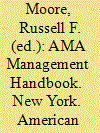

|
|
|
|
|
| Publication |
New York, American Management Association Inc., 1970.
|
| Description |
Hbk
|
| Standard Number |
0-8144-5212-4
|
|
|
|
|
|
|
|
|
|
|
|
Copies: C:1/I:0,R:0,Q:0
Circulation
| Accession# | Call# | Current Location | Status | Policy | Location |
| 007262 | 658/MOO 007262 | Main | On Shelf | General | |
|
|
|
|
| 3 |
ID:
175026


|
|
|
|
|
| Summary/Abstract |
With state-led support being only temporary, attention has turned to retail electricity markets to provide long-term support for renewable electricity. Past research has focused on consumer preferences for green electricity, i.e. the demand side. We investigated the supply side by analyzing what suppliers selling green retail electricity products in the UK, Germany, France and Italy actually provide. Through content analysis of the online data provided by these companies, we found that most products in Germany and France rely on Scandinavian hydropower. Since almost all of these plants have been operating for decades, these products today cannot be said to effectively drive new renewable capacities. Products in the UK and Italy rely on sources which already have state-led support and thus also do not drive the expansion of renewables. In fact, none of the four countries has established a policy framework that successfully fosters the development of a voluntary market for green electricity capable of driving the expansion of renewables. Alignment between sustainable energy policy objectives, consumer demand, and supply-side offerings in a voluntary market might be improved by empowering consumers through a simplified and possibly state-led labeling scheme that focuses on environmental impact and includes minimum standards for performance.
|
|
|
|
|
|
|
|
|
|
|
|
|
|
|
|
| 4 |
ID:
136297


|
|
|
|
|
| Summary/Abstract |
This article examines a particular body of post-millennial fiction in English from India whose narratives draw significantly on Hindu epics and the historical contexts of early Bharat. This body of fiction includes works by Amish Tripathi, Nilanjan P. Choudhury, Ashwin Sanghi amongst others, and I refer to this writing as ‘Bharati Fantasy’ (my term). The article deals with how this new body of fiction might be received in the global literary market as well as how it is received in the domestic market given that some of these novels are ‘for sale in India only’. The article postulates how genre categorisation might affect an Indian writer's presence in the global literary market. Furthermore, it looks at how important it is to be present in such global markets, and considers how the domestic market of India provides a readership and marketing arena which are significantly self-sustaining and independent of the global literary markets. The popularity of ventures in India such as the Jaipur and Bangalore literature festivals, the recent launch of Doordarshan's ‘Kitaabnama' and hunger for ‘popular’ literature by a readership with enhanced disposable income suggest that home-grown talent is increasingly well celebrated and appreciated at home.
|
|
|
|
|
|
|
|
|
|
|
|
|
|
|
|
| 5 |
ID:
040238
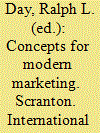

|
|
|
|
|
| Publication |
Scranton, International textbook company, 1968.
|
| Description |
xiv,324p.Pbk
|
|
|
|
|
|
|
|
|
|
|
|
Copies: C:1/I:0,R:0,Q:0
Circulation
| Accession# | Call# | Current Location | Status | Policy | Location |
| 006120 | 658.5036/DAY 006120 | Main | On Shelf | General | |
|
|
|
|
| 6 |
ID:
090693
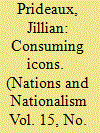

|
|
|
|
|
| Publication |
2009.
|
| Summary/Abstract |
In extension of Billig's (1995) and Edensor's (2002) contribution to the literature, this paper examines an often overlooked element in 'mundane' nationalism, company advertising. Through the development of a typology of advertising strategies, it examines the role of companies as nationalist actors, and highlights how advertisements can engage with and impact on wider national discourses. Nationalist company advertising is classified into types, depending on how associated the company is with nationalism in popular discourse, and whether the advertising campaign involves the company's participation in broader nationalistic political projects. The types developed in this typology include (1) 'ordinary marketing/achieving nationalist credentials', (2) 'ordinary marketing/established nationalist credentials' and (3) 'activist marketing/achieving nationalist credentials'. Case studies from the Australian context are used to illustrate these types, how the different types use nationalism, and their varying impact on shaping wider nationalistic discourses.
|
|
|
|
|
|
|
|
|
|
|
|
|
|
|
|
| 7 |
ID:
094999


|
|
|
|
|
| Publication |
2010.
|
| Summary/Abstract |
What are local foods? If you do not know your local producer, then how can you know whether the product you are purchasing is local? These questions are at the heart of an emerging debate in the United States about authenticity and the value of local eating. In the United States, from the menus of its elite restaurants, to urban farmer markets, to the procurement strategy of its largest corporation, "local" is fast becoming an important food category. Several distinct forces drive its popularity and yet, in the absence of certain credence attributes to assure what indeed is local, its future is uncertain. This article explores what defines "local" and how the term is protected in trade. It suggests that intellectual property protection is underdeveloped to foster local food product designations. Cases in the United States illustrate that some viable mechanisms do exist to ensure the specific provenance of a food but that in large interconnected markets these mechanisms present some notable challenges for both producers and consumers. In its review of different approaches to protecting and fostering local food systems, the article finds that geographical indications (GIs) may be more conducive to local food systems because they are not owned but rather attributed, and, in this way, even smaller producers have access to the marketing potential of a GI label. Improving approaches to GIs in the United States, perhaps learning from the sui generis systems in other countries, could further the development, protection, and success of local products.
|
|
|
|
|
|
|
|
|
|
|
|
|
|
|
|
| 8 |
ID:
034211
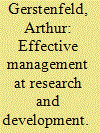

|
|
|
|
|
| Publication |
California, Addison-Wesley Publishing Company, 1976.
|
| Description |
ix, 150p.Hbk
|
|
|
|
|
|
|
|
|
|
|
|
Copies: C:1/I:0,R:0,Q:0
Circulation
| Accession# | Call# | Current Location | Status | Policy | Location |
| 007294 | 658.57/GER 007294 | Main | On Shelf | General | |
|
|
|
|
| 9 |
ID:
028626
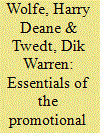

|
|
|
|
|
| Publication |
New York, Appleton century crofts, 1970.
|
| Description |
xiii, 304p.Pbk
|
| Standard Number |
39095621X
|
|
|
|
|
|
|
|
|
|
|
|
Copies: C:1/I:0,R:0,Q:0
Circulation
| Accession# | Call# | Current Location | Status | Policy | Location |
| 006185 | 658.8/WOL 006185 | Main | On Shelf | General | |
|
|
|
|
| 10 |
ID:
108912
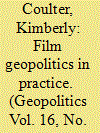

|
|
|
|
|
| Publication |
2011.
|
| Summary/Abstract |
This essay demonstrates how critical geopolitics of film can benefit from attention to behind-the-scenes practices in films' lives by examining "territorial appeals": invocations of territorial interest or identity to justify a project or win support for a position. By tracing marketing strategies in the emergence of The Miracle of Bern, a 2003 film that celebrates West Germany's World Cup football victory over Hungary in 1954, the essay shows opportunities and limitations of territorial appeals to win production funds, find distributors, and shape discourse at home and abroad. This study of negotiations among a variety of actors and institutions reveals how marketing - in all its forms - is on the "front lines" of national identity construction and perception.
|
|
|
|
|
|
|
|
|
|
|
|
|
|
|
|
| 11 |
ID:
113510
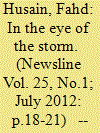

|
|
|
|
|
| Publication |
2012.
|
| Summary/Abstract |
It took a long time coming, but when it did, not many within the media industry were surprised. All is not well inside the media machine, but strangely, viewers are just finding out.
|
|
|
|
|
|
|
|
|
|
|
|
|
|
|
|
| 12 |
ID:
148221
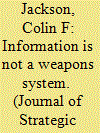

|
|
|
|
|
| Summary/Abstract |
While many militaries have tried to capitalize on the potential of information operations in internal war, few have succeeded. I argue that military information campaigns fall short of expectations for two reasons. First, the theory of influence militaries generally embrace – communications as a non-lethal weapons system – is largely invalid. While treating information as a weapons system makes it easier to integrate it into the existing military planning system, this overstates the independent effects of communications on behavior and understates the importance of interactive effects of what commercial marketing theory refers to as the “marketing mix” – product, price, promotion, and placement. It would be more appropriate to treat military information operations as a form of marketing: a composite effort to induce a specific behavior in a target audience by applying a combination of material and ideational instruments. The marketing model suggests that the efficacy of information operations will depend not simply on the message and its delivery (promotion) but on the behavior the sender seeks to induce (the product), the costs of that behavior (the price), and the opportunities available for such behavior (the placement).
|
|
|
|
|
|
|
|
|
|
|
|
|
|
|
|
| 13 |
ID:
106679
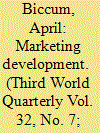

|
|
|
|
|
| Publication |
2011.
|
| Summary/Abstract |
Politics and culture, once considered separate, are now fusing in new and interesting ways. Political activism is becoming popular, particularly through the expansion of a new kind of development advocacy made highly visible through celebrity involvement. Theorists of globalisation celebrate the democratisation of civil society made possible by new information and communications technology; critical theorists will note the various ways in which ict ambivalently makes the contradictions in global capitalism more obvious and has become the means by which globalisation is contested. Some metropolitan governments have sought to capitalise on this new knowledge economy by making knowledge for development part of their strategies to produce 'global citizens' necessary for the global economy. This paper examines the linkages between celebrity and government-funded development advocacy in Australia, which comprise the introduction of free market principles to form a marketing campaign for neoliberal globalisation.
|
|
|
|
|
|
|
|
|
|
|
|
|
|
|
|
| 14 |
ID:
087839
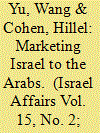

|
|
|
|
|
| Publication |
2009.
|
| Summary/Abstract |
Among multiple aspects of Israeli dominance over the Palestinians from
both sides of the Green Line, the ideological one appears as the single most
spectacular failure. Members of the Israeli establishment readily acknowledge
the notorious inefficiency of the Israeli public relations campaign in
Arabic.1 Although the Israeli Broadcast Authority (IBA) maintains radio
and TV broadcasts-and even attempted for a short while to launch a
Middle East Satellite Channel (2002-2005)-the overall impact of these
efforts on shaping Palestinian or, more generally, Arab public opinion
is negligible.2 The reasons for this failure are not difficult to assess: even
for the most sophisticated public relations campaign it would be difficult
to market Israel to the hostile Palestinian and Arab audience, particularly
to those who are direct victims of either occupation or discrimination.
But does this mean that efforts to present Israeli viewpoints to the Arab
public are meaningless and intrinsically doomed? To examine this
supposition, this article will analyze one of the most interesting attempts
of the Israeli authorities to communicate with the Palestinians through a
printed medium: the first seven years of the seventeen-year long life of
al-Anbaa (The News) newspaper (1968-1985).
|
|
|
|
|
|
|
|
|
|
|
|
|
|
|
|
| 15 |
ID:
163679
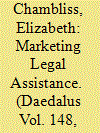

|
|
|
|
|
| Summary/Abstract |
Much of the American conversation about access to justice focuses on regulatory barriers to new forms of service delivery and treats regulatory resistance as the primary problem to be solved. Meanwhile, obstacles to consumer awareness and engagement have received less attention. This essay reverses the order of analysis and considers strategies for expanding access first from a marketing perspective. What models of legal assistance have been most successful in building consumer awareness and trust? To what extent can successful marketing help to sidestep or overcome regulatory resistance? And what are the implications for reformers interested in expanding access to justice?
|
|
|
|
|
|
|
|
|
|
|
|
|
|
|
|
| 16 |
ID:
076503
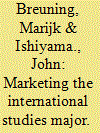

|
|
|
| 17 |
ID:
043474
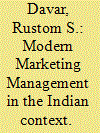

|
|
|
|
|
| Publication |
Bombay, progressive Corporation Private Ltd., 1969.
|
| Description |
xxiv, 632p.Hbk
|
| Series |
Progressive series in management
|
|
|
|
|
|
|
|
|
|
|
|
Copies: C:1/I:0,R:0,Q:0
Circulation
| Accession# | Call# | Current Location | Status | Policy | Location |
| 003543 | 658/DAV 003543 | Main | On Shelf | General | |
|
|
|
|
| 18 |
ID:
103464
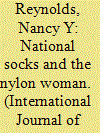

|
|
|
|
|
| Publication |
2011.
|
| Summary/Abstract |
he specific ways that cloth-"foreign silks," "durable Egyptian cottons," and "artificial silks"-emerged as a potent and visible symbol through which to contest the relations of colonialism and establish national community in Egypt varied with the changing realities of Egypt's political economy. The country's early importation of textiles despite its cultivation of raw cotton, the growth of its state-protected local mechanized industry working long- and medium-staple cotton for a largely lower-class market, and that industry's diversification into artificial silk technologies all helped structure a shift from "foreign silks" to "the nylon woman" as tropes in popular and political discourse defining the limits of the national community and the behaviors suitable for it. Although artificial fibers considerably lowered the cost of hosiery and other goods, thereby expanding consumption, the use of synthetics like nylon rather than cotton subverted the goal of national economic unity between agriculture and industry.
|
|
|
|
|
|
|
|
|
|
|
|
|
|
|
|
| 19 |
ID:
134399


|
|
|
|
|
| Summary/Abstract |
The development sector appeals to emotions in its marketing and education material to raise awareness and funds for its work. Much of this material is now directed at schools, where young people form long-lasting opinions about development and the developing world. This paper draws upon research with 118 students in five New Zealand/Aotearoa secondary schools to show that young people are not passive receptors of development marketing and education. Instead, they question the activities of international ngos involved in aid work and how they are meant to feel or act in response. We examine these emotional responses of young people and the demoralising feelings of guilt, sadness and scepticism that arise, often alongside an innocent paternalism and a desire to help. We outline possibilities for more socially progressive forms of development education, based on the recognition that young people are questioning old ways of doing aid work and looking for something new. We challenge ngos to be part of new forms of global connectedness that disrupt old ‘us and them’ binaries based on difference, and instead to pursue new linkages based on shared feelings of empathy, friendship and social justice.
|
|
|
|
|
|
|
|
|
|
|
|
|
|
|
|
| 20 |
ID:
178820


|
|
|
|
|
| Summary/Abstract |
Replacing natural gas with biomethane is an option to help decarbonize residential heating and cooling. But little biomethane is in the voluntary markets for heating. We examined biomethane-based gas tariff offerings in the UK, Germany, Austria and Switzerland, using qualitative content analysis and compared them to the national policy contexts. We find that current policies in all four countries under review clearly prioritize using biomethane for electricity generation and in transport, while leaving the heating market largely unregulated. Nonetheless, we find influence of policies on the heating market. Offerings in Germany show this influence in their biomethane content and underlying feedstock and in Austria regionality seems to be driven by grid charge regulations. If German policy makers want to channel more biomethane into residential heating, they are advised to harmonize competing support schemes for biomethane in electricity generation, transport and heating/cooling, waive mandatory CHP requirements, lower minimum biomethane content and to target existing, not just new, buildings. In the UK, the RHI should include residential buildings and using the Austrian refund system could help to develop biomethane tariffs from regional sources in Switzerland.
|
|
|
|
|
|
|
|
|
|
|
|
|
|
|
|
|
|
|
|
|